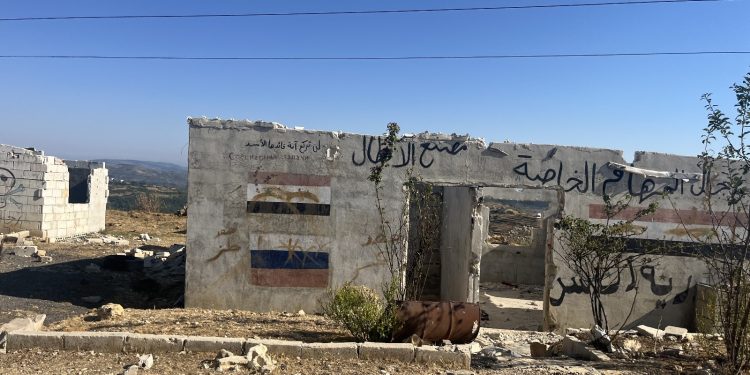By IWU-FI Correspondent in Syria
22 August 2025. An IWU-FI delegation carried out an extensive visit to Syria in July, lasting almost two weeks. The delegation, which toured numerous provinces of the country, held meetings with revolutionaries, political activists, and intellectuals, and held very fruitful meetings to develop political collaborations and joint activities both in Syria and surrounding areas.
IWU-FI has consistently backed the uprisings in North Africa and the Middle East, helping people’s rebellions against dictatorships. In this context, unlike the reformist socialist currents that supported the bourgeois and dictatorial regime of Bashar al-Assad or others that remained neutral, we also support the struggle of the Syrian people against the dictator Assad. We did so from an independent position, without giving political support to the bourgeois, Islamist, or secular rebel leaderships, seeking to achieve a workers’ government and a socialist Syria.
The IWU-FI led or took part in numerous international solidarity campaigns. Following the overthrow of the Assad regime, the IWU-FI continues to be one of the staunchest supporters of the struggle now being waged by the Syrian people against the new Shara government, in defence of the demands for freedom and dignity it supported from the beginning. Below are our comrades’ observations during the trip.
From Aleppo to Damascus, along the paths of a Syria without Assad
We landed at the recently reopened Aleppo airport. After embracing our comrades who were waiting for us there, we visited, with their guide, the devastated old centre of Aleppo and the citadel. Although we had closely followed how Russian aircraft bombings and explosive barrels dropped by the Assad regime’s helicopters destroyed Aleppo, seeing that destruction with our own eyes for the first time was equally horrifying. The sorrow was worsened by the pride of supporting the fight against a brutal dictatorship and the anger at the left’s support for the regime.
After meetings with comrades and friends in Aleppo and Manbij, we arrived in Homs, known as “the capital of the revolution.” Although the level of destruction in Homs was comparable to that in Aleppo, we found a more vibrant and politically dynamic city. After the meetings there, we also visited Salamiyah, Misyaf, and Qadmus, cities where the leftist movement has always been strong, along with Homs. In all these cities, we listened to the immense experiences accumulated since 2011, and discussed the current political situation and prospects for the future.
From Latakia to Damascus and the Quest to Build a Revolutionary Socialist Alternative
We then headed to the coastal region. In Latakia, we met with both veteran socialists and young activists. Those comrades had witnessed and endured the Assad regime’s oppression, fought against it, endured imprisonment, and they were now advancing the political struggle against the new government, while also participating in solidarity campaigns. The massacre perpetrated in March by pro-government militias against Alawite villages remained the central issue in the region. Activists continued to demand justice and punishment for those responsible for the massacre, and they demanded the release of the kidnapped people because the government’s investigation was a sham.
After Latakia, we headed to the capital, Damascus. As we approached, we experienced feelings similar to those we had experienced travelling from Aleppo to Hama. Just as there, on the outskirts of Damascus, from Douma to the capital’s bus terminal, we witnessed the immense destruction caused by the aerial bombardments. However, upon reaching the centre of Damascus, the political capital, we could hold lively discussions with numerous revolutionaries and activists of different tendencies. The last planned destination of our trip was Sweida, but first the closure of the roads, then the outbreak of clashes and the bloody intervention of the government prevented the visit. Faced with the massacres perpetrated by pro-government forces that were reminiscent of the March massacres on the coast, from that moment on we took part as militants of the IWU-FI, both politically and materially, in solidarity activities with the people of Sweida.
Despite the devastation and weariness left by 14 years of revolution and civil war, the energy, and curiosity of the young activists, as well as the tenacity and lucidity of the seasoned revolutionaries, gave us successful hope and optimism. After 54 years of a bloody dictatorship, the prisons filled with political prisoners have emptied. For the first time, people can discuss politics and organise political meetings without reservation. Especially in Damascus and other places where the left has historically been strong, it is possible to develop political activities and other social organisations or to advocate for the trial and punishment of the dictatorship’s crimes. All this opens the possibility of taking steps toward building a revolutionary socialist organisation.













